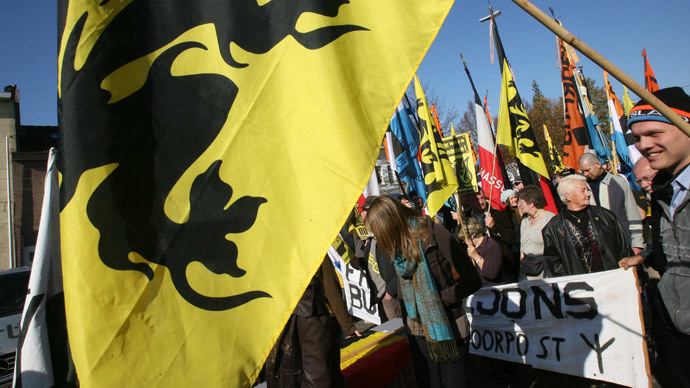‘Flemish independence: better to become good friends than stay together in a bad marriage’

An independent Flanders with Brussels as its capital will be best for the Flemish people who represent 60 percent of the Belgium population, and provide 80 percent of its economy, Flemish MP Tom van Grieken told RT.
Following in the footsteps of Scotland, Veneto in Italy and Catalonia in Spain, and Belgium’s Flemish region may become the next to hold a referendum on independence. The Flanders area of northern Belgium has been claiming its own sovereignty for years, and if it succeeds, Belgium may be no more, along with its being the symbol of a united Europe.
The 2008 financial crisis has boosted separatism movements in Europe, with rich and developed regions in a number of countries starting to voice their discontent with policies from the capital, and the necessity to feed economically weak regions. However, for such Scotland, Catalonia and Flanders it is also a question rooted in the history of the formation of the countries they belong to.
READ ALSO: 'Independent Veneto can help EU’
Dutch-speaking Flanders and French-speaking Wallonia have always been rich and well-developed regions, connected to each other despite language and cultural differences. The artificial creation of the Belgian state put these nations into a difficult situation, forcing them to coexist with people they don’t feel any connections with. Meanwhile, Scotland’s independence vote has inspired the Flemish people with hope to finally create their own state.
RT:Why does your party Vlaams Belang (“Flemish Interest”) support independence of Flanders?
Tom van Grieken: We are the only party in Belgium who are for Flemish independence. We think Belgium is dead, it is from the beginning in 1830 an artificial state, where two different people are forced to live together. Although we are only 60 percent of the population of Belgium, we produce 80 percent of our economy. Independent Flanders with Brussels as its capital will be the best for the Flemish people.
RT:The world’s attention is now chained to the Scottish referendum. After this vote we expect Catalonia to follow the same path. If Flanders was to hold a referendum, what results do you foresee?
TG: The importance of holding a referendum – it’s not the result which is important. The public debate concerning becoming independent is also important. In my country there is almost no debate on public television about independence, although the population really wants it. For example, in Scotland whether it is “yes” or “no” vote when the referendum results are made public, they already have their victory simply by having a public debate about independence of the people.

RT:Is it mostly for political reasons that the Flemish people seek independence? Does Flanders want to take decisions on its own?
TG: Of course it’s not our main purpose. The economic part is also very important. Like I have already said, 60 percent of the population of Belgium is Dutch-speaking, Flemish-speaking and they produce 80 percent. Also there are differences between cultures – the Flemish culture is completely different [from] the French culture in the south. We also have different political views: [in] the south [people] are all socialists, social-democrats and the North Flemish part votes for the right and center-right. It would be the best democratic solution to split up Belgium.
RT:Do you think in case of “yes” vote Flanders, Catalonia and Veneto will be able to survive?
TG: Of course. Small nation-states can produce easier answers to the difficult questions we all face in Europe. Flanders will not be smaller than independent Ireland or Denmark, or Estonia, or Lithuania. We would be a full-grown nation-state in the heart of Europe.
RT:How do you see the development of the situation?
TG: I think it will be like in a marriage. At the moment we are always fighting in every discussion but we should divorce, split up and become good friends, good neighbors. I think it will be our first economic partner to work together with but it’s better to become good friends than stay together in a bad marriage.
RT:What are the reasons for a marriage to become bad? And what makes bad neighbors?
TG: What makes bad neighbors? Of course it’s not something among individuals. As you know, my country, Belgium, where I’m forced to live in, holds the world’s record for days without government because we don’t agree on anything. Every political discussion has an aspect which Flemish and Wallonia people disagree on. So it would be better not only for Flanders but also for my French friends in the south.
RT:Do you think a referendum is needed?
TG: Yes, of course. We are the only independence party in Belgium. I think referendum is a good thing because if you are afraid of the opinion of your people, then you are not ready to be a leader of your people. So I think we need also in Belgium a referendum concerning the Flemish independence.
The statements, views and opinions expressed in this column are solely those of the author and do not necessarily represent those of RT.
The statements, views and opinions expressed in this column are solely those of the author and do not necessarily represent those of RT.












